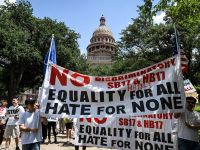Would you want to move to Baghdad?
As recently as the 1970s, Iraq’s capital was lauded as exemplary in the Arab world. It was modern, diverse and fast-paced. But now, with several conflicts under its belt and sectarian violence on the rise, Baghdad is anything but desirable.
According to a recent study by the Mercer consulting group, Baghdad placed last when it comes to quality of life. This is no small loss – Mercer looks at 239 cities, taking into account factors such as political stability, crime and pollution, Agence France Presse (AFP) reported.
Baghdad’s residents face near-daily violent attacks, a shortage of electricity and clean water, wide-spread governmental corruption and high unemployment – just to name a few.
“We live in a military barracks,” complained Hamid al-Daraji to AFP. A paper salesman, al-Daraji is referring to the ubiquitous checkpoints, concrete blast walls and security forces peppered throughout the city. The charm of the 1,250-year-old-city, which was once hailed as the academic, economic and political center of the world, seems to have been lost.
“The rich and the poor share the same suffering,” the 48-year-old continued to AFP. “The rich might be subjected at any moment to an explosion, a kidnapping, or a killing, just like the poor.
During the 20th century, Baghdad was widely regarded as the perfect example of a modern Arab city. It was packed with some of the Middle East’s best universities and museums, and it was home to a “highly educated elite, a vibrant cultural scene and top-notch healthcare,” according to AFP.
Baghdad’s civilians were diverse, with Muslims, Christians and Jews living side-by-side.
“Baghdad represented the economic center of the Abbasid state,” Essam al-Faili told AFP. He is a professor of political history at the city’s Mustansiriyah University, an institution that traces its own history back nearly 800 years.
“It was used as a base for taking control of neighboring areas in order to strengthen Islamic influence.”
“It used to be a capital of the world,” Faili said, “but today, it has become one of the world’s most miserable cities,” according to AFP.
With sectarian violence on the rise, Iraq has become a minefield for sectarian attacks. According to an AFP tally, 57 attacks struck Baghdad in February alone and earlier this month, by March 6, 31 people died in two days of violence.








